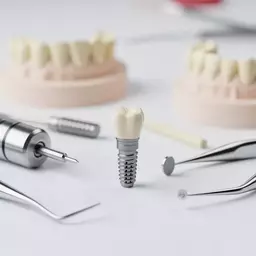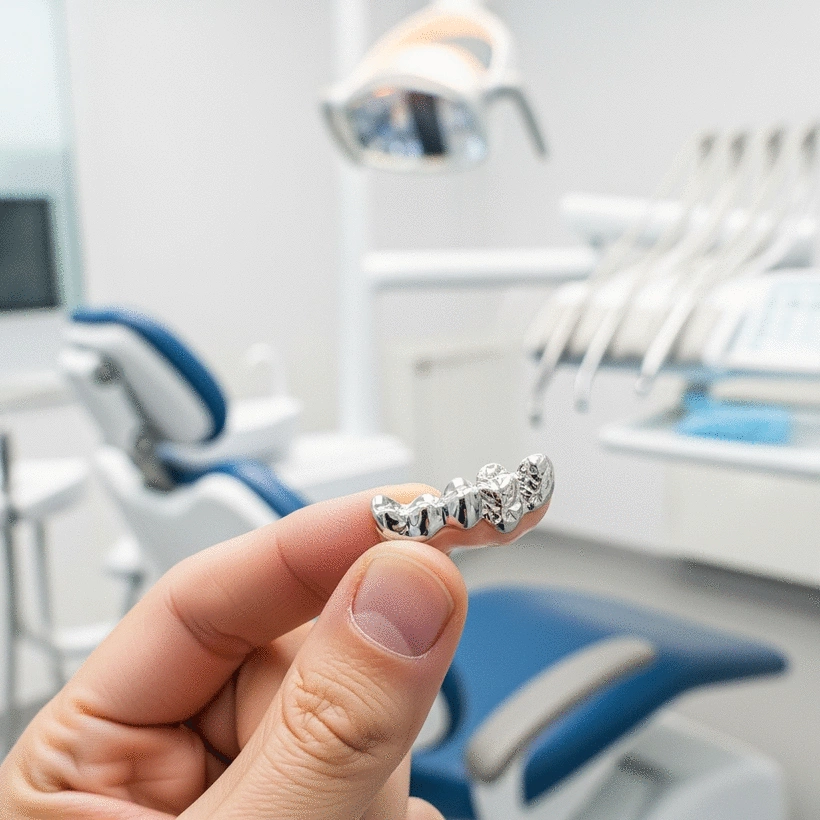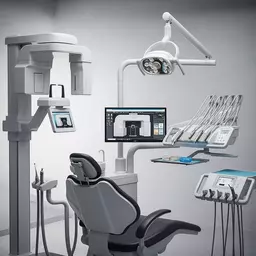Choosing Your Ideal Dental Implant
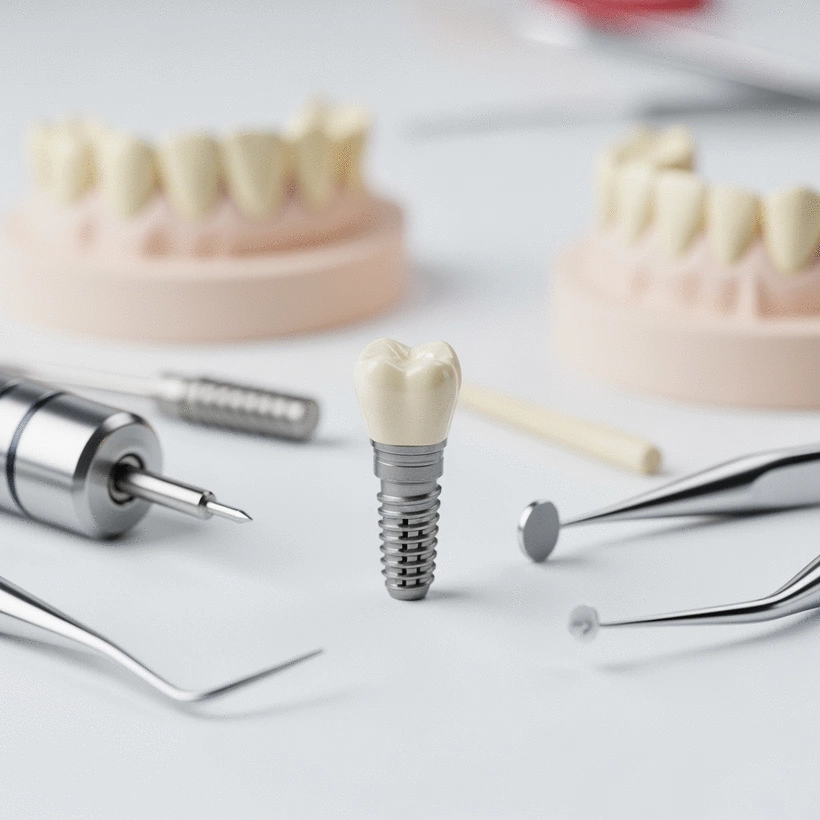
What if the key to a radiant smile lies beneath the surface? Dental implants not only restore your teeth, but they also play a crucial role in enhancing your overall oral health. Understanding their importance can empower you to make informed decisions about your dental care.
What You Will Learn
- Dental implants serve as artificial roots, providing a stable foundation for replacement teeth.
- The process involves multiple steps: consultation, surgery, abutment placement, and crown placement.
- Key benefits include improved aesthetics, enhanced comfort, better speech, and increased confidence.
- Osseointegration is vital for implant success, requiring adequate bone density and good oral hygiene.
- Different types of implants exist, such as single tooth, All-on-4, mini, titanium, and zirconia, catering to various needs.
- Personalized consultations with specialists can help determine the best implant options for you.
- Post-implant care is essential for longevity, including proper hygiene and regular dental check-ups.
The Journey of a Dental Implant: From Consultation to Confidence
Understanding the multi-step process and diverse options for dental implants can empower you to make informed decisions for your oral health. Below, we've outlined the typical process flow and key implant choices. For more insights into maintaining a healthy mouth, consider reading about key oral hygiene practices explained.
Dental Implant Process Flow
1. Consultation
Assessment of dental health & bone density.
2. Surgery
Implant placement into jawbone, healing period.
3. Abutment
Connector attached after successful healing.
4. Crown
Custom-made crown affixed for final restoration.
Best Dental Implant Options
Single Tooth Implants
Ideal for replacing one missing tooth without affecting surrounding teeth.
All-on-4 Implants
Perfect for complete arch replacement, providing a sturdy foundation.
Mini Implants
Less invasive option suitable for patients with limited bone density.
Titanium Implants
Known for their strength and durability, making them a popular choice.
Understanding Dental Implants and Their Importance
Have you ever thought about what happens when you lose a tooth? The good news is that dental implants offer a reliable solution to restore your smile! They act as artificial tooth roots, providing a strong foundation for replacement teeth. Knowing more about dental implants can help you make informed choices about your oral health.
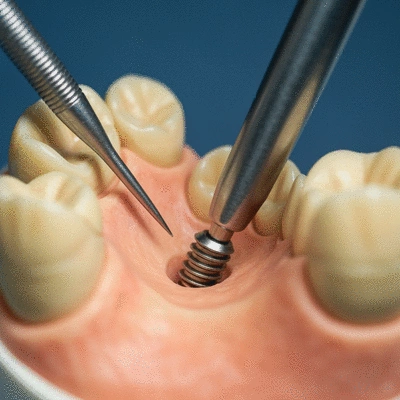
At Best Dentist Sydney, I often discuss the transformative effects of dental implants with my patients. They not only improve the aesthetics of your smile but also play a crucial role in maintaining jawbone health. Let’s explore this topic more deeply together!
What Are Dental Implants and How Do They Work?
Dental implants are small titanium posts that are surgically placed into your jawbone. They serve as sturdy anchors for artificial teeth, which can be crowns, bridges, or dentures. The process typically involves a few steps:
- Consultation: A thorough assessment of your dental health and jawbone density.
- Surgery: Placement of the implant into the jawbone, followed by a healing period.
- Abutment placement: After healing, a connector is attached to the implant.
- Crown placement: Finally, a custom-made crown is affixed, completing the restoration.
This multi-step process ensures that the implant integrates well with your jawbone, allowing for a secure and durable solution. It’s essential to choose a skilled dentist to guide you through each phase of the treatment.
Key Benefits of Choosing Dental Implants for Tooth Replacement
Choosing dental implants comes with numerous advantages that can significantly enhance your quality of life. Here are some key benefits:
- Improved appearance: Dental implants look and feel like natural teeth!
- Enhanced comfort: Unlike dentures, implants become a part of you and won’t slip or shift.
- Better speech: No more mumbling or slurring—your speech remains clear and confident!
- Increased confidence: Enjoy social situations without worrying about your smile!
These benefits make dental implants an excellent option for many patients. They not only restore function but also help you regain the confidence to smile brightly again! To further enhance your smile, you might also consider cosmetic dentistry in Sydney.
The Role of Osseointegration in Implant Success
One of the key processes that contribute to the success of dental implants is osseointegration. This is when the titanium implant fuses with the jawbone, creating a stable anchor for the artificial tooth. It’s fascinating how your body can adapt to new implants!
Osseointegration typically takes several months, during which your bone grows around the implant. Here are a few factors that can influence this process:
- Bone density: Adequate bone structure is vital for proper integration.
- Oral hygiene: Maintaining good oral health will support the healing process.
- Smoking: Avoiding tobacco can enhance healing and integration rates.
Ensuring you are a good candidate for osseointegration starts with a thorough consultation. I encourage my patients to ask questions and express any concerns during our discussions, as this can lead to a more successful outcome.
We Want to Hear From You!
What aspect of dental implants are you most curious about? Share your thoughts below:
Frequently Asked Questions About Dental Implants
- What are dental implants?
- Dental implants are artificial tooth roots, usually made of titanium, that are surgically placed into the jawbone to provide a stable foundation for replacement teeth (crowns, bridges, or dentures).
- What are the main benefits of dental implants?
- Key benefits include improved appearance, enhanced comfort (as they don't slip like dentures), better speech, and increased confidence. They also help preserve jawbone health.
- How long does the dental implant process take?
- The process typically involves several steps: consultation, surgery for implant placement, a healing period (osseointegration) that can take several months, abutment placement, and finally, crown placement. The total duration varies by individual.
- What is osseointegration and why is it important?
- Osseointegration is the process where the dental implant fuses with the jawbone. It's crucial for implant success as it creates a stable and durable anchor for the artificial tooth. Factors like bone density and oral hygiene influence this process.
- What are the different types of dental implants?
- Common types include single tooth implants (for one missing tooth), All-on-4 implants (for full arch replacement), mini implants (for limited bone density), titanium implants (known for strength), and zirconia implants (a metal-free alternative).
- How do I find a good dental implant specialist?
- You can start by checking online reviews, visiting specialists' websites to assess their expertise, and asking for recommendations from family, friends, or your current dentist.
- What kind of aftercare is needed for dental implants?
- Aftercare is vital for long-term success and includes maintaining proper oral hygiene (brushing and flossing), scheduling regular dental check-ups, and avoiding hard foods initially during recovery.
Summarizing Key Insights for Your Dental Implant Journey
As we wrap up our discussion on dental implants, it’s essential to bring together the critical insights that can guide you on your journey toward a healthier smile. Dental implants can genuinely transform your oral health and confidence, but understanding your options is crucial. From the various types of implants to the financial considerations and ongoing care, let’s recap the best choices tailored to your individual needs!
Recap of the Best Dental Implant Options for Varying Needs
Choosing the right dental implant depends on several factors, including your specific dental requirements and lifestyle. Here’s a quick overview of the best dental implant options available:
- Single Tooth Implants: Ideal for replacing one missing tooth without affecting surrounding teeth.
- All-on-4 Implants: Perfect for those needing a complete arch replacement, providing a sturdy foundation.
- Mini Implants: A less invasive option suitable for patients with limited bone density.
- Titanium Implants: Known for their strength and durability, making them a popular choice.
- Zirconia Implants: A great alternative for those seeking a metal-free option, offering a natural look.
By understanding these options, you can make an informed decision that aligns with your oral health goals. It’s always wise to consult with a specialist to determine which implant type fits your unique situation best!
Encouraging Consultations with Specialists for Personalized Advice
It’s crucial to remember that no two smiles are alike! Consulting with a dental implant specialist can provide you with personalized advice tailored to your needs. During your consultation, consider asking:
- What type of implants do you recommend for my dental needs?
- What can I expect during the procedure and the recovery process?
- How do you handle potential complications or concerns?
- What aftercare will I need to ensure my implants last?
These questions will help you gather the necessary information to feel confident in your choice. As the owner of Best Dentist Sydney, I encourage you to take this important step toward achieving a radiant smile!
Taking the Next Steps: Your Action Plan for Choosing Dental Implants
Now that you have a solid foundation about dental implants, let’s talk about how to take those next steps toward securing your perfect smile. Knowing where to start can sometimes feel overwhelming, but I’m here to help simplify the journey for you!
Researching Local Dental Implant Specialists: Where to Start
Finding the right dental implant specialist in Sydney can significantly impact your experience and outcome. Here’s how to begin your search:
- Check Online Reviews: Look for specialists with positive feedback and testimonials from previous patients.
- Visit Their Websites: Explore their offerings and read about their expertise and credentials.
- Ask for Recommendations: Talk to family, friends, or your current dentist about specialists they trust.
Taking these steps can give you peace of mind and help you find someone aligned with your needs and values.

Engaging with Patient Communities for Support and Insights
Connecting with others who have undergone similar experiences can be incredibly beneficial! Patient communities can provide support and valuable insights. Here are some ways to engage:
- Join Online Forums: Platforms like Facebook groups or dedicated dental health forums can offer a wealth of shared experiences.
- Attend Local Support Groups: Look for gatherings or seminars focused on dental health where you can meet others.
- Share Your Journey: Sharing your experiences can inspire others and foster a sense of community!
These connections can help you feel less alone and more empowered in your dental journey. Remember, you’re not just choosing a procedure; you’re investing in your health!
Understanding Aftercare for Implants: Ensuring Long-Term Success
Aftercare is a vital part of ensuring your dental implants last for years to come! It’s essential to establish a robust aftercare routine. Here are some key aspects to consider:
- Maintain Proper Oral Hygiene: Brush and floss regularly to keep your mouth clean and healthy.
- Schedule Regular Check-Ups: Regular visits to your dentist can help catch any issues early on.
- Avoid Hard Foods Initially: Be gentle with your new implants and avoid tough or crunchy foods during recovery.
By taking these steps, you’ll set yourself up for long-term success with your dental implants. Remember, I’m always here at Best Dentist Sydney to support you along the way! If you're looking for guidance on choosing the right dental professional, check out our guide on choosing a dental clinic in Sydney.
Recap of Key Points
Here is a quick recap of the important points discussed in the article:
- Dental implants serve as artificial tooth roots, providing a strong foundation for replacement teeth.
- Key benefits of dental implants include improved appearance, enhanced comfort, better speech, and increased confidence.
- Osseointegration is crucial for implant success, influenced by factors such as bone density and oral hygiene.
- Different types of implants are available, including single tooth implants, all-on-4 implants, mini implants, titanium implants, and zirconia implants.
- Consulting with a dental specialist and engaging with patient communities can provide valuable insights and support throughout your journey.
- Maintaining proper aftercare, including good oral hygiene and regular check-ups, is essential for long-term success with dental implants.


